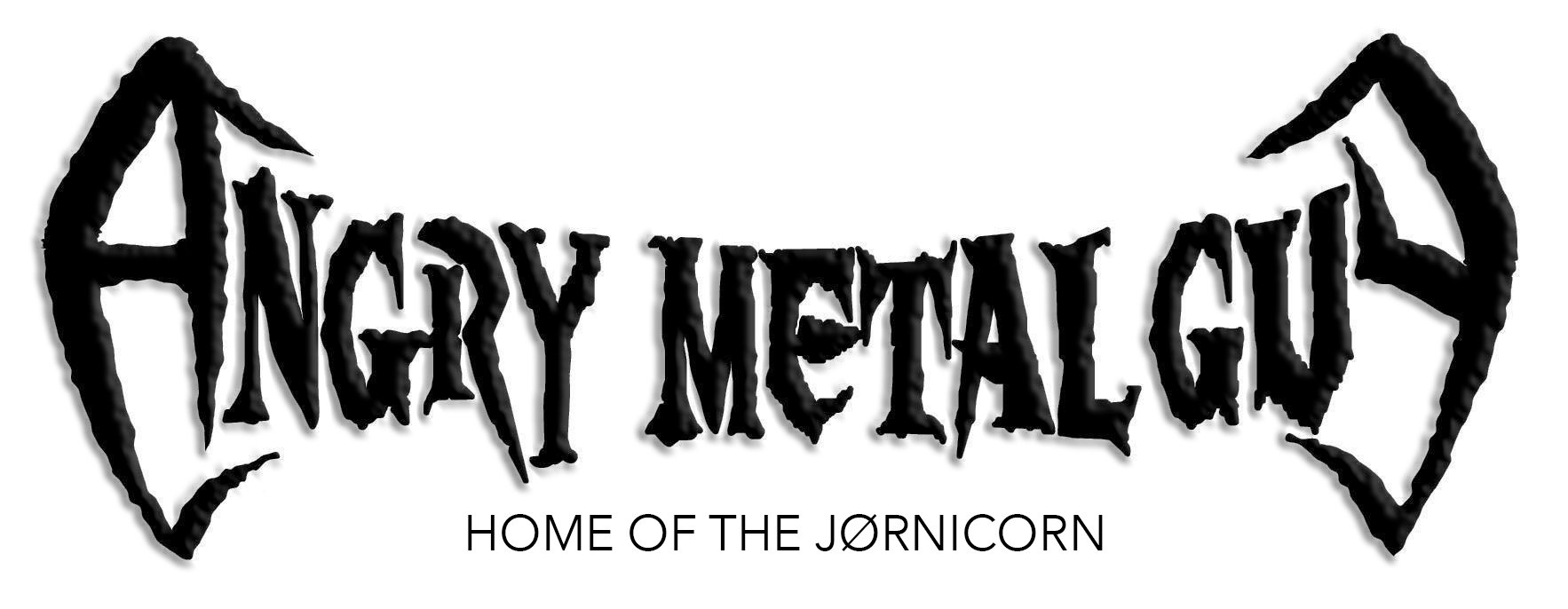On September 4th, Iron Maiden released its 16th studio album. This new platter is a double-disc monstrosity by the name of The Book of Souls, and now that I’ve received my physical copies, I’m going to be re-listening to it a dozen times with lyrics in hand. So, while we’re waiting on this I’m taking advantage of the moment to do something I’ve wanted to do for a very, very long time: a huge Iron Maiden retrospective, spanning the band’s entire studio discography. Here’s the final installment. [And here’s the first, second, third and fourth.]
#3: Somewhere in Time [1986]: I have to admit that for a long time Somewhere in Time was among my least favorite Iron Maiden albums and ranked among the records in the band’s discography that received the fewest spins. I always felt like the album had more awkward moments and filler than other records from the same era in the band’s career, like SiT was just a stepping stone for Seventh Son of a Seventh Son; as Opeth’s Heritage presaged the transition to the much more cohesive Pale Communion or Tull’s Songs from the Wood developed a sound which was better executed on Heavy Horses. While I still hold that Somewhere in Time fits the bill of Maiden finding its footing before producing a better record, I’ve actually grown to adore Somewhere in Time. Not only do I think that the art is some of the best of its era—with the ’80s futuristic Eddie being one of my favorite incarnations of the band’s mascot, and one of those amazingly detailed pieces of art you’d never see again in a post-vinyl era—but this album is laced with under-appreciated gems.
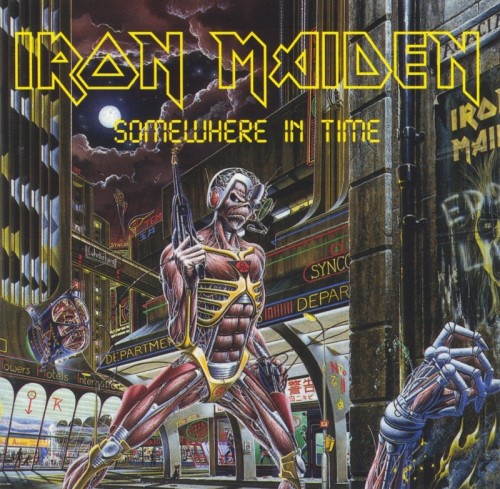
What likely threw a lot of fans for a loop was the fact that this album featured synths so prominently. In an era when people apparently really did beat each other up because of synthesizers, it has been related to me that this was seen as the band “selling out” or losing their metal cred. I, of course, think that the use of guitar synths is charming, even if it dates the hell out of the sound. When I listen to Piece of Mind or The Number of the Beast, I don’t think of the band as sounding particularly like the early ’80s from a production standpoint. However, the harder you try to jam the newest thing into your music, the more your music sounds like the era when that newest thing was getting popular; and Somewhere in Time sounds like 1986. Furthermore, Adrian Smith—likely the most pop and rock-oriented of Maiden’s songwriters—had three complete songs that he’d written alone end up on this album: “Wasted Years,” “Sea of Madness,” and “Stranger in a Strange Land.” These songs add a poppy element, particularly “Wasted Years” and “Sea of Madness,” and this added a tone that I don’t think people had ever associated with Maiden up to this point.
Somewhere in Time also is a record that defied the band’s tendency of b-sides that didn’t quite live up to the a-sides of their albums. The Number of the Beast and Powerslave both feature b-sides that aren’t quite as good, but while Somewhere in Time doesn’t feature any of its most well-known or well-loved songs on the back half, it features four songs that are excellent deep cuts. ‘Arry’s “The Loneliness of the Long Distance Runner” and Murray’s token addition “Deja-Vu” are both slightly awkward lyrically, but musically spot on. “Stranger in a Strange Land” is a mid-paced beauty that features a great groove, a fantastic pre-chorus and one of the best choruses on the record as well as H’s trademark guitar work—creative and playful, using way more interesting chord structures than straight power chords. But the crowning glory on Somewhere in Time is the epic “Alexander the Great,” an epic often overlooked unfairly and which has never been played live by the band. The song has a great build, a massive chorus, and features the band’s most interesting progressive solo at about the 4 minute mark.
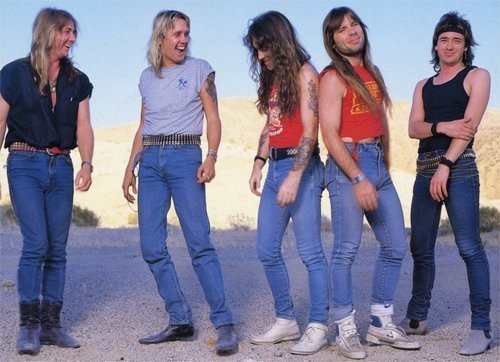
Put all of this together with the well known and well loved hits here, “Wasted Years,” “Heaven Can Wait,” and “Caught Somewhere in Time,” and Somewhere in Time is a real corker. Loaded for bear with a unique feel and great tracks, I’m surprised it’s not more universally loved. The one strike against it is that across the board the lyrics are a bit wonky or awkward. “Alexander the Great” is not a poetic showing by any means, “Deja-Vu” is slightly ill-conceived, and H’s lazy end-rhymes on “Sea of Madness” and “Wasted Years” have always caused my skin to crawl. But these little things don’t detract from the whole of what is an awesome, and often underrated, record by a band that was gearing up for something even more special.
#2: Piece of Mind [1983]: I’ve spent a lot of time aching about the records in the middle of this list. When you start ranking albums, the bottom ones are simple; turning phrases like “vocal chords in his scrotum” and “an old man shaking a crooked finger at society” make those blurbs a pleasure. There’s no question that piling on a crappy record is the easy part. The middle records, though? Those are hard. When albums are neck-and-neck, the decisions to move one or the other up or down feels rather arbitrary, and that takes a lot of time and a lot of thought. Piece of Mind at the number two spot? That didn’t take much time at all. From the beginning 1983’s finest album and Nicko McBrain’s bombastic introduction to the world has been ranked here, because Piece of Mind is a brilliant record.
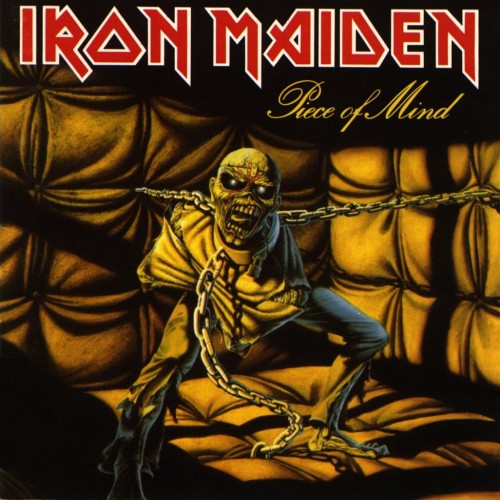
I’ve always been partial to Piece of Mind and I consider it the second best from the classic period, and the best of the pre-keyboards era for sure. Starting with why it’s best is easy: the songs, the songs, the songs. I’m not sure what happened during the writing process, but the tracks on this record absolutely gelled into one of the most finely riffed and interesting heavy metal records of all time. From opener “Where Eagles Dare,” an iconic and undeniable track, the record walks listeners through amazing riffs, stupendous solos, and a drumming sound that would become iconic, with Nicko riffing away in the background. “Revelations” (which you’ll be surprised to hear is the second-most-frequently live track from this album) lilts forward before getting heavy, “Still Life” has an intro that reminds me of the tone of “Remember Tomorrow” before turning into something way more sinister, and the epic “To Tame a Land” is a great example of ‘Arry’s dominant and fascinating bass guitar style, which I referenced in my description of the band’s self-titled record.
Even the tracks normally criticized as filler, I love. “Sun and Steel” has a bombastic and ridiculous chorus that only the pop-rock-loving Adrian Smith could pull off and it’s grown on me over the years. “Still Life” has gotten very little love over the years, but Dave Murray’s contributions usually seem to work for me, and it’s a great song with a strange, but fascinating topic and a really cool feel. And while “Quest for Fire” should probably be banned for school-aged children—due to perpetuating the ridiculous notion that, indeed, dinosaurs and humans ever lived on the earth at the same time—Harris’s bubbly bass, the ridiculous chorus, and the classic Maiden guitar leads have gotten to me after all this time. I wouldn’t throw myself in front of a bus to save that song, but since it’s not even 4 minutes, and I like it more than I’d normally admit in public, I don’t feel like it kills the record.
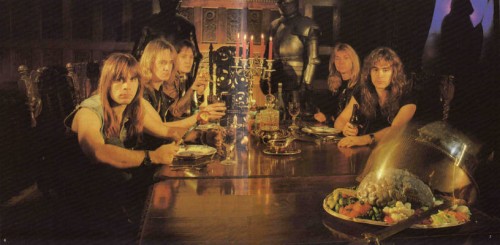
And as a whole? Piece of Mind sounds vital, heavy and is a fun record. Bruce sounds remarkably good on this album, having developed as a singer since The Number of the Beast, and I’ve always loved the guitar tone here. Murray and H have such a classic tone that Marshall-driven sound from this album absolutely defines “British heavy metal” for me. While the flow here isn’t quite along the lines of AMoLaD or SSoaSS, I’ve always felt like the consistency of the record and the high quality of the tracks made me want to listen to it from front to back, never skipping anything and always loving the sound.
Piece of Mind wasn’t the band’s most aggressive or most progressive material. The record doesn’t burn out the gate like Powerslave or have the world-shattering high points of The Number of the Beast. And for a lot of fans who started with latter and waited for the former, Piece of Mind has always seemed like an afterthought; as Druhm put it, the record was released so quickly after he discovered The Number of the Beast that he didn’t have time to anticipate its release. But I say that the combination of great songs (“Flight of the Icarus,” “Where Eagles Dare,” “The Trooper”… need I say more?), consistency from start to stop and a newly vitalized rhythm section with the addition of Nicko, this is close to as good as it ever got.
#1: Seventh Son of a Seventh Son [1988]: Seventh Son of a Seventh Son is as good as it ever got. This album is most perfect heavy metal record ever produced. From Dickinson’s opening strains to bracketing lines which end the album, this record is an unassailable work of genius. Seventh Son of a Seventh Son is one of those rare moments when stellar songwriting meets album flow, creating something that defines why we even listen to albums as a whole. Unlike any other Iron Maiden record, there are no notes out of place, there are no unnecessary lines or things that could have been edited out to tighten things up. From the incredible artwork to the excellent production, this album was charmed.
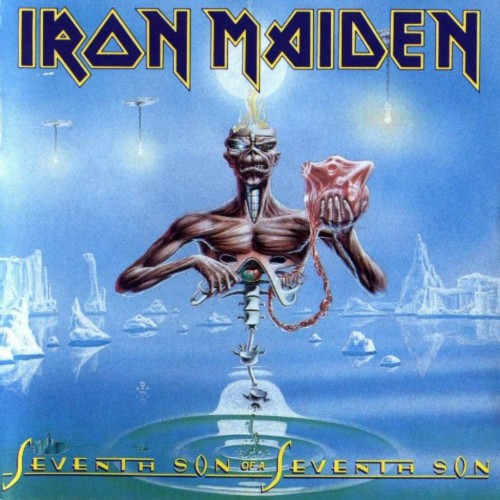
I’ve spent a lot of time trying to analyze precisely what it is about this record that nails it, and the answer I’ve come to is that I think it’s where they finally perfected their own formula. To say that Maiden had a formula would be disingenuous, of course, but there is a certain balance between the rangy and progressive (“Infinite Dreams,” “Seventh Son of a Seventh Son”), the poppy and immediate (“Can I Play with Madness,” “Only the Good Die Young,” and “The Evil that Men Do”) and the heavy and epic (“The Prophecy,” “The Clairvoyant”). Each of these tracks contains, to a great or lesser extent, these different aspects of the band, but they bleed through these different songs and the balancing act is done with grace and alacrity; it’s varied, but cohesive.
Missing, too, are the cheesy and half-baked ideas that resulted in “Quest for Fire” or “22 Acacia Avenue,” replaced instead by the pinnacle of Maiden’s lyrics in the 1980s. Every song is laced memorable, cool, and interesting lyrics, held together by a diffuse theme embodied by the name Seventh Son of a Seventh Son. “Moonchild” sets the tone (“I am he, the bornless one / The fallen angel watching you…”), but it’s carried through by amazing tracks like “The Evil that Men Do” (“Love is a razor and I walked the line on that silver blade / Slept in the dust with his daughter, her eyes red with the slaughter of innocence”), or “The Prophecy” (“Suffering and pain / Impending disaster / Souls cry / The devil’s laughter / I heard the cry of the seven whistlers / Lucifer smiles, looks on and waits…”). Bruce delivers these lines with a spitfire passion and gymnastic grace, and his performances bolster the perfect balance between fantastical and poetic, walking the line on the silver blade that so many metal bands fall on.
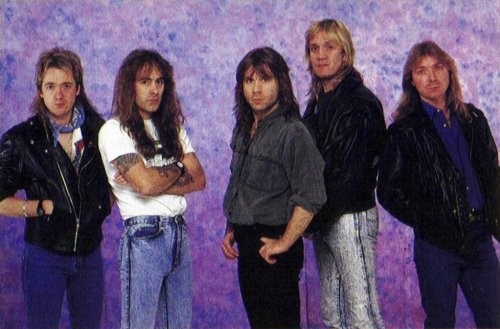
Compositionally, I think that Seventh Son also includes Maiden’s best songwriting. Not just the balance of styles, but the sharpest riffs, best hooks, and most entrancing guitar solos. With the backing of keyboard—but without the over-the-top guitar synth of Somewhere in Time—the dual guitar leads take on a nearly neo-classical sound, and everything resting in a bed of synth, fitting perfectly into the composition; it’s meticulous. “Seventh Son of a Seventh Son,” a massive epic which features Bruce knocking out that tongue twister dozens of times, is so compelling because of the perfect guitar work and build. “The Prophecy,” one of my favorite songs ever, is mid-paced and features a slow intro, but convinces with its epic solos and gorgeous outro (without mentioning Bruce’s fantastic vocal performance). Maiden made better use of their signature harmonies and epic guitar work on Seventh Son than on any of their other records, and I could go on for hours about how it all works so well.
All of these different factors, of course, combine to make Seventh Son of a Seventh Son a magical record and a triumph for the band. The production is excellent, the songwriting is tight, and I don’t think Bruce ever sounded so good on album before or after. While the sound is really wet with keyboards, and therefore not as immediate as Powerslave or Piece of Mind, this record succeeds where they didn’t with the sheer quality of songs, riffs, and consistency. This album has come to represent for me everything that I think heavy metal should be: its epic scope, its melodic genius, its perfect coherence, its dynamic range of 13 and its 44 minute run time. There’s no way I could ever rank another Maiden album above this one. But then again, I can’t ever imagine ranking another album above this one.
